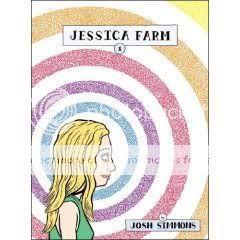Jessica Farm Vol. 1
Josh Simmons, writer/artist
Fantagraphics, April 2008
100 pages
$14.95
It’s a truism to say that comics have an unlimited special effects budget, thus casting their unfettered nature with regards to other narrative arts like film and television as primarily rooted in spectacle. But that sky’s-the-limit difference can be a formal one as well. With few if any physical or logistical constraints on an ongoing creator-owned comic’s length–particularly during this Internet Age–the ways in which stories are told may be similarly stretched. Any artist with a preexisting propensity for rambling, discursive narratives will find this limitlessness to be right in their wheelhouse.
No one seems to be stepping up to this plate with more determination than Josh Simmons, the underground-informed cartoonist behind many gleefully vulgar minis and anthology contributions who really exploded into comics-cognoscenti consciousness with his relentlessly bleak, wordless survival-horror graphic novel House last year. Jessica Farm Vol. 1 is the initial fruition of a project he’s apparently had simmering for eight years, a projected 600-page graphic novel drawn one page per month and released in 96-page installments every eight years until its completion in the year 2050. With Jessica Farm, Simmons has created a comics-reading experience where getting there isn’t half the fun–it is, by definition and at least for the next half-century or so, all the fun.
Is it fun? The answer is a qualified yes. For starters, Simmons tackles the erotic far more directly than any other cartoonists of his generation that I can think of, excepting Hans Rickheit I suppose–certainly more directly than anyone else with his Fantagraphics-granted level of exposure. The parts of this volume I’ll remember most vividly involve the titular teen (?) grabbing other male characters by the cock on more than one occasion, an earthy and erotically matter-of-fact gesture. While character design does not strike me as Simmons’s strong suit, he does give Jessica a winsome jolie-laide beauty, with wide eyes and sensually ropy tresses. And he really tapdances along the line that separates sexy from smutty from potty-humor in his depiction of his characters’ bodies. When we catch a glimpse of Jessica’s pudenda sticking out slightly from between her legs as we see her shower from behind, or when the mute, naked Mr. Sugarcock seasons her soup by dipping his balls in it Louie-from-The-State-style, or when Sugarcock’s full-tilt sprinting is indicated by his namesake member flopping like a windsock in the opposite direction, the sight is intimate, titillating and discomfiting all at once.
Indeed Simmons excels as an artist of human physicality. Fans of his memorably gruesome Batman pastiche will no doubt be delighted to find that comic’s thoughtful illustration of the body at work echoed throughout Jessica Farm, from watching tiny little people clamber up stairs that are each twice their height to the many shots of Jessica diving or pole-sliding through the many floors of her seemingly enchanted home. Depicting the cavernous and claustrophic contours of that home and other environments by moving his characters through them is another great strength of Simmons’s cartooning, and the scenes in which Jessica and her alternately adorable and threatening companions wend their way through the house’s darkened corridors no doubt contain within them the seeds of House, the artist’s full-length exploration of exploring.
The problem with this experiment, I suppose, is one of its methodology. The attention-getting publishing schedule is no doubt what made you aware of the book in the first place, and in terms of sounding completely awesome, hey, mission accomplished. But once you hit page 96 and realize that it’ll be another eight years before a subsequent volume provides you with a continuation–and more importantly, a context for–what you’ve just read, the bloom fades off that rose in a hurry. As I was getting at before, the format lends itself perfectly to a peripatetic story in which Jessica, Alice- (or Odysseus)-like, has a variety of surreal encounters. But as Alan Moore once astutely pointed out, myths need a Ragnarok, and without the hard defining line of an ending (at least until the grandchildren of the Bushes and Clintons are running for office), there’s no real way to judge whether Jessica’s rambling, discursive adventures are more or less than the sum of their dream-logic parts. So for every powerful image, like the Paperhouse-esque silhouette/villain/father or the little French band that plays in Jessica’s shower, there’s something that seems a bit on the nose without further explanation or exploration, like the cute li’l monkey getting stabbed to death or a room full of giant fetus-babies with their eyes gouged out and tongues pulled out. Without the constant an ending would provide, the equation is unsolvable. Of course, we wouldn’t even be discussing these challenging topics if the comic were not an experiment to begin with.
Tags: comics, comics reviews, Comics Time, reviews


Comics Time: Where Demented Wented: The Art and Comics of Rory Hayes
Where Demented Wented: The Art and Comics of Rory Hayes Rory Hayes, writer/artist Dan Nadel and Glenn Bray, editors Fantagraphics, August 2008 144 pages $22.99 Buy it from Fantagraphics Buy it from Amazon.com I do a lot of reading…
Pingback: Comics Time: Jessica Farm (January 2008-April 2011) « Attentiondeficitdisorderly by Sean T. Collins